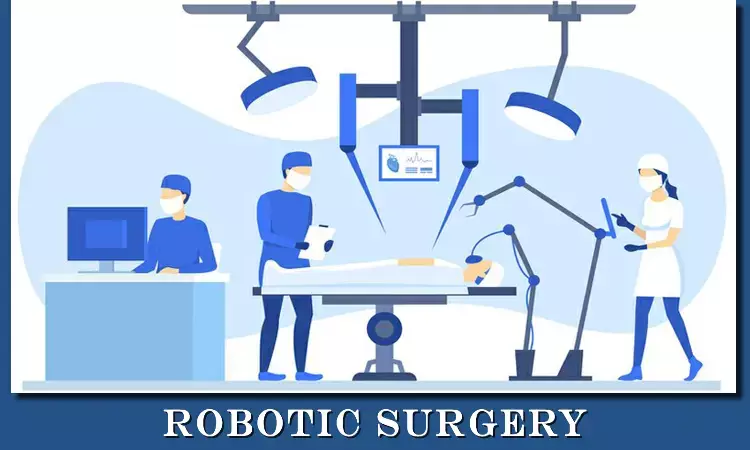- Home
- Medical news & Guidelines
- Anesthesiology
- Cardiology and CTVS
- Critical Care
- Dentistry
- Dermatology
- Diabetes and Endocrinology
- ENT
- Gastroenterology
- Medicine
- Nephrology
- Neurology
- Obstretics-Gynaecology
- Oncology
- Ophthalmology
- Orthopaedics
- Pediatrics-Neonatology
- Psychiatry
- Pulmonology
- Radiology
- Surgery
- Urology
- Laboratory Medicine
- Diet
- Nursing
- Paramedical
- Physiotherapy
- Health news
- Fact Check
- Bone Health Fact Check
- Brain Health Fact Check
- Cancer Related Fact Check
- Child Care Fact Check
- Dental and oral health fact check
- Diabetes and metabolic health fact check
- Diet and Nutrition Fact Check
- Eye and ENT Care Fact Check
- Fitness fact check
- Gut health fact check
- Heart health fact check
- Kidney health fact check
- Medical education fact check
- Men's health fact check
- Respiratory fact check
- Skin and hair care fact check
- Vaccine and Immunization fact check
- Women's health fact check
- AYUSH
- State News
- Andaman and Nicobar Islands
- Andhra Pradesh
- Arunachal Pradesh
- Assam
- Bihar
- Chandigarh
- Chattisgarh
- Dadra and Nagar Haveli
- Daman and Diu
- Delhi
- Goa
- Gujarat
- Haryana
- Himachal Pradesh
- Jammu & Kashmir
- Jharkhand
- Karnataka
- Kerala
- Ladakh
- Lakshadweep
- Madhya Pradesh
- Maharashtra
- Manipur
- Meghalaya
- Mizoram
- Nagaland
- Odisha
- Puducherry
- Punjab
- Rajasthan
- Sikkim
- Tamil Nadu
- Telangana
- Tripura
- Uttar Pradesh
- Uttrakhand
- West Bengal
- Medical Education
- Industry
Robotic pancreatoduodenectomy safe, associated with minimal surgical complications: BMJ

In addition to being practical and reliable, robotic pancreatoduodenectomy (RPD) has a low conversion rate to open surgery, minimal risk of surgical complication, and promotes postoperative recovery of abilities essential for daily life, says an article published in BMC Surgery.
Regarding the viability, security, and possibility of a robotic pancreatoduodenectomy and whether it raises surgical risks, there is no general agreement. By comparing the perioperative data from laparoscopic pancreatoduodenectomy (LPD), open pancreatoduodenectomy (OPD), and RPD performed in our center in recent years, Wei Guo's study sought to evaluate the safety, viability, and logic of RPD.
Retrospectively gathered and evaluated were the clinical data of patients who underwent RPD (n = 32), LPD (n = 21), and OPD (n = 86) in The First Affiliated Hospital of Guangxi Medical University between January 2016 and June 2020.
The key findings of this study were:
1. While the abdominal drainage tube had to be removed, RPD needed less time to do so than OPD did (12.5 days vs. 17.3 days, p = 0.001).
2. The differences between the LPD group and the RPD group were notable because both groups experienced similar amounts of blood loss (482.8 ml vs. 559.5 ml, p > 0.05) and operation time (537.2 min vs. 592.9 min, p = 1.000), but the RPD group experienced a higher activity of daily living score on postoperative day 3 (35.8 vs. 25.7, p = 0.0017) and a lower rate of conversion to OPD.
3. There were no notable variations between the three groups in terms of complications including postoperative pancreatic fistula, abdominal hemorrhage, intra-abdominal infection, bile leakage, reoperation, and perioperative death.
In conclusion, this study reveals that RPD not only delivers significant benefits in terms of short-term operative results without raising the surgical risks, but is also practical and dependable for the excision of benign and malignant tumors. Future research will need to include multiple subjects and large-scale RCTs in order to draw conclusive results.
Reference:
Guo, W., Ye, X., Li, J., Lu, S., Wang, M., Wang, Z., Yao, J., Yu, S., Yuan, G., & He, S. (2022). Comparison of surgical outcomes among open, laparoscopic, and robotic pancreatoduodenectomy: a single-center retrospective study. In BMC Surgery (Vol. 22, Issue 1). Springer Science and Business Media LLC. https://doi.org/10.1186/s12893-022-01797-4
Neuroscience Masters graduate
Jacinthlyn Sylvia, a Neuroscience Master's graduate from Chennai has worked extensively in deciphering the neurobiology of cognition and motor control in aging. She also has spread-out exposure to Neurosurgery from her Bachelor’s. She is currently involved in active Neuro-Oncology research. She is an upcoming neuroscientist with a fiery passion for writing. Her news cover at Medical Dialogues feature recent discoveries and updates from the healthcare and biomedical research fields. She can be reached at editorial@medicaldialogues.in
Dr Kamal Kant Kohli-MBBS, DTCD- a chest specialist with more than 30 years of practice and a flair for writing clinical articles, Dr Kamal Kant Kohli joined Medical Dialogues as a Chief Editor of Medical News. Besides writing articles, as an editor, he proofreads and verifies all the medical content published on Medical Dialogues including those coming from journals, studies,medical conferences,guidelines etc. Email: drkohli@medicaldialogues.in. Contact no. 011-43720751


